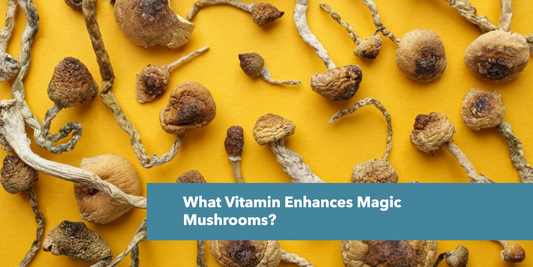Magic mushrooms, which contain the psychoactive compound psilocybin, have been studied for their potential therapeutic effects on various mental health conditions, including anxiety. Research indicates that psilocybin may help alleviate symptoms of anxiety, particularly in individuals with treatment-resistant depression and anxiety disorders.
How do magic mushrooms affect anxiety levels?
Psilocybin, the active compound in magic mushrooms, interacts with serotonin receptors in the brain, especially the 5-HT2A receptor. This interaction can result in altered perceptions, mood changes, and a heightened sense of connectedness, which are believed to contribute to its therapeutic effects. Research indicates that psilocybin can facilitate profound experiences, enabling individuals to confront and process their anxiety in a new way.
Research Findings
Clinical Trials: Several clinical trials have shown that psilocybin can significantly reduce anxiety and depression in patients with terminal illness, helping them cope with existential distress. For instance, a study published in JAMA Psychiatry found that patients receiving psilocybin reported substantial decreases in anxiety and depression symptoms after treatment.
Is Magic Mushroom safe to use for Anxiety?
Psilocybin is generally considered safe when used in a controlled setting. Most participants report manageable side effects, such as nausea or transient anxiety during the experience, but these are typically outweighed by the therapeutic benefits.
which type of magic mushrooms help with anxiety?
Several types of magic mushrooms have been studied for their potential benefits in managing anxiety, including Psilocybe cubensis, Psilocybe semilanceata, Psilocybe cyanescens and Psilocybe azurescens.
Psilocybe cubensis
Description: One of the most widely cultivated and studied species of magic mushrooms.
Potential Benefits: Research suggests that Psilocybe cubensis may reduce symptoms of anxiety and depression, especially in individuals facing terminal illnesses or treatment-resistant conditions.
Psilocybe semilanceata (Liberty Cap)
Description: A small mushroom commonly found in grassy fields, particularly in Europe and North America.
Potential Benefits: While specific studies on this species for anxiety are limited, its psilocybin content indicates it may have similar therapeutic effects as other psilocybin-containing mushrooms.
Psilocybe cyanescens (Wavy Cap)
Description: Known for its distinctive wavy cap and high potency.
Potential Benefits: Although direct research on Psilocybe cyanescens for anxiety is limited, its strong psilocybin content suggests it may provide anxiety relief similar to other species.
Psilocybe azurescens
Description: One of the most potent psilocybin mushrooms, often found in the Pacific Northwest of the United States.
Potential Benefits: Due to its high potency, Psilocybe azurescens may offer significant therapeutic effects, including anxiety reduction, but should be approached with caution.
What are the Benefits of the Magic Mushrooms on Anxiety?
Most research on microdosing is based on what people say about their own experiences and the benefits they notice. However, a new clinical trial coming up might give us more detailed information.
People who have answered surveys about microdosing often say they do it to work better and be more productive. This can mean many things, but they usually mention:
- Feeling happier
- Being more creative
- Having more energy
- Being able to concentrate and focus better
Are there any studies on the use of magic mushrooms for anxiety relief?
Yes, there are several studies that have investigated the potential use of magic mushrooms, specifically the compound psilocybin, for anxiety relief. Here are some of the key studies:
A Randomized Controlled Trial of Psilocybin-Assisted Therapy for Cancer-Related Distress (2016)
This study, published in the Journal of Psychopharmacology, found that a single dose of psilocybin produced immediate, substantial, and sustained decreases in anxiety and depression in patients with life-threatening cancer.
The effects were maintained at 6-month follow-up, with 80% of participants showing clinically significant decreases in anxiety or depression.
Psilocybin with Psychological Support for Treatment-Resistant Depression: Six-Month Follow-Up (2018)
This study, published in Psychopharmacology, examined the long-term effects of psilocybin-assisted therapy in patients with treatment-resistant depression.
The results showed that a single dose of psilocybin produced rapid and sustained antidepressant effects, with 47% of participants meeting criteria for response at 6-month follow-up.
Although not specifically focused on anxiety, the study suggests that psilocybin may have broader therapeutic potential for mental health conditions.
Psilocybin-Assisted Therapy for Demoralization in Long-Term Cancer Survivors (2021)
This pilot study, published in Psycho-Oncology, explored the use of psilocybin-assisted therapy in long-term cancer survivors experiencing demoralization, a form of existential distress.
The results showed significant reductions in demoralization, anxiety, and depression at 1-month follow-up, with improvements maintained at 3-month follow-up.
Psilocybin-Assisted Therapy of Major Depressive Disorder Using Acceptance and Commitment Therapy as a Therapeutic Framework (2021)
This case series, published in the Journal of Contextual Behavioral Science, described the use of psilocybin-assisted therapy with Acceptance and Commitment Therapy (ACT) as a therapeutic framework for major depressive disorder.
Although not specifically focused on anxiety, the study highlights the potential of combining psilocybin with evidence-based psychotherapeutic approaches to enhance therapeutic outcomes.
Can magic mushrooms help with treating anxiety disorders?
Yes, magic mushrooms, which contain the psychoactive compound psilocybin, show promise in helping to treat anxiety disorders. Several studies and clinical trials have explored the effects of psilocybin on anxiety, particularly in specific populations such as those with treatment-resistant anxiety or terminal illnesses.
What are the potential side effects of using magic mushrooms for anxiety?
Using magic mushrooms, which contain the psychoactive compound psilocybin, can lead to various side effects, particularly when used for anxiety treatment. While many individuals report positive experiences, it is essential to be aware of potential adverse effects. Here are some of the key side effects associated with psilocybin use:
Short-term Side Effects
- Nausea and Vomiting:
- Anxiety and Panic:
- Altered Perception
- Mood Swings
- Confusion and Disorientation
Long Term Effects
- Psychological Distress
- Hallucinogen Persisting Perception Disorder (HPPD)
- Potential for Substance Use Disorder
How do magic mushrooms compare to other treatments for anxiety?
Magic mushrooms, specifically the compound psilocybin, have shown potential in treating anxiety disorders. This is a relatively new area of research, but early studies suggest that a single, supervised dose of psilocybin can produce long-lasting reductions in anxiety symptoms.




